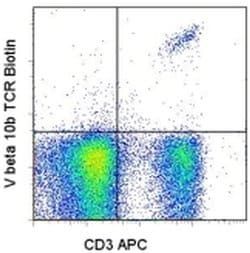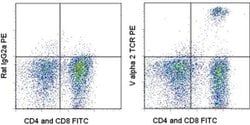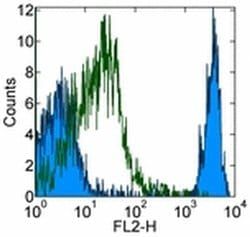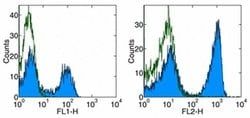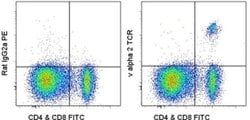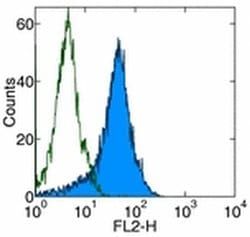7069106
TCR V beta 10b Monoclonal Antibody (B21.5), Biotin, eBioscience™, Invitrogen™
Rat Monoclonal Antibody
Manufacturer: Fischer Scientific
The price for this product is unavailable. Please request a quote
Antigen
TCR V beta 10b
Concentration
0.5 mg/mL
Classification
Monoclonal
Form
Liquid
Regulatory Status
RUO
Formulation
PBS with 0.09% sodium azide; pH 7.2
Gene Alias
T cell receptor beta chain; Tcrb; TCRbeta; Tib
Gene Symbols
Tcrb
Primary or Secondary
Primary
Content And Storage
4° C, store in dark, DO NOT FREEZE!
Gene
Tcrb
Clone
B21.5
Applications
Flow Cytometry
Conjugate
Biotin
Host Species
Rat
Target Species
Mouse
Gene Accession No.
0
Gene ID (Entrez)
21577
Isotype
IgG2a λ
Purification Method
Affinity chromatography
Product Type
Antibody
Description
- Description: The B21.5 monoclonal antibody reacts with the Vbeta10 T Cell Receptor (TCR) in mice of the b haplotype of the TCR Vbeta gene complex, which includes AKR, BALB/c, CBA, C3H/He, C57BL, DBA/1 and DBA/2 mice
- It does not react with Vbeta10 in mice of the a or c haplotypes of the TCR Vbeta gene complex, including C57BR, C57L, SJL, and SWR mice
- Applications Reported: This B21.5 antibody has been reported for use in flow cytometric analysis
- Applications Tested: This B21.5 antibody has been tested by flow cytometric analysis of C57Bl/6 mouse splenocytes
- This can be used at less than or equal to 0.25 μg per test
- A test is defined as the amount (μg) of antibody that will stain a cell sample in a final volume of 100 μL
- Cell number should be determined empirically but can range from 10^5 to 10^8 cells/test
- It is recommended that the antibody be carefully titrated for optimal performance in the assay of interest
- Filtration: 0.2 μm post-manufacturing filtered
- The ability of T cell receptors (TCR) to discriminate foreign from self-peptides presented by major histocompatibility complex (MHC) class II molecules is essential for an effective adaptive immune response
- TCR recognition of self-peptides has been linked to autoimmune disease
- Mutant self-peptides have been associated with tumors
- Engagement of TCRs by a family of bacterial toxins know as superantigens has been responsible for toxic shock syndrome
- Autoantibodies to V beta segments of T cell receptors have been isolated from patients with rheumatoid arthritis (RA) and systemic lupus erythematosus (SLE)
- The autoantibodies block TH1-mediated inflammatory autodestructive reactions and are believed to be a method by which the immune system compensates for disease (ref5)
- T Cell and TCR Diversity Most human T cells express the TCR alpha-beta and either CD4 or CD8 molecule (single positive, SP)
- A small number of T cells lack both CD4 and CD8 (double negative, DN)
- Increased percentages of alpha-beta DN T cells have been identified in some autoimmune and immunodeficiency disorders
- Gamma-delta T cells are primarily found within the epithelium
- They show less TCR diversity and recognize antigens differently than alpha-beta T cells
- Subsets of gamma-delta T cells have shown antitumor and immunoregulatory activity.
Compare Similar Items
Show Difference
Antigen: TCR V beta 10b
Concentration: 0.5 mg/mL
Classification: Monoclonal
Form: Liquid
Regulatory Status: RUO
Formulation: PBS with 0.09% sodium azide; pH 7.2
Gene Alias: T cell receptor beta chain; Tcrb; TCRbeta; Tib
Gene Symbols: Tcrb
Primary or Secondary: Primary
Content And Storage: 4° C, store in dark, DO NOT FREEZE!
Gene: Tcrb
Clone: B21.5
Applications: Flow Cytometry
Conjugate: Biotin
Host Species: Rat
Target Species: Mouse
Gene Accession No.: 0
Gene ID (Entrez): 21577
Isotype: IgG2a λ
Purification Method: Affinity chromatography
Product Type: Antibody
Antigen:
TCR V beta 10b
Concentration:
0.5 mg/mL
Classification:
Monoclonal
Form:
Liquid
Regulatory Status:
RUO
Formulation:
PBS with 0.09% sodium azide; pH 7.2
Gene Alias:
T cell receptor beta chain; Tcrb; TCRbeta; Tib
Gene Symbols:
Tcrb
Primary or Secondary:
Primary
Content And Storage:
4° C, store in dark, DO NOT FREEZE!
Gene:
Tcrb
Clone:
B21.5
Applications:
Flow Cytometry
Conjugate:
Biotin
Host Species:
Rat
Target Species:
Mouse
Gene Accession No.:
0
Gene ID (Entrez):
21577
Isotype:
IgG2a λ
Purification Method:
Affinity chromatography
Product Type:
Antibody
Antigen: TCR DO11.10
Concentration: 0.5 mg/mL
Classification: Monoclonal
Form: Liquid
Regulatory Status: RUO
Formulation: PBS with 0.09% sodium azide; pH 7.2
Gene Alias: D011.10; T cell receptor alpha chain; Tcra; Tcralpha
Gene Symbols: Tcra
Primary or Secondary: Primary
Content And Storage: 4° C, store in dark, DO NOT FREEZE!
Gene: Tcra
Clone: KJ1-26 (KJ126, KJI-26, KJI26), KJI-26, KJI26)
Applications: Flow Cytometry
Conjugate: Biotin
Host Species: Mouse
Target Species: Mouse
Gene Accession No.: P01849
Gene ID (Entrez): 21473
Isotype: IgG2a κ
Purification Method: Affinity chromatography
Product Type: Antibody
Antigen:
TCR DO11.10
Concentration:
0.5 mg/mL
Classification:
Monoclonal
Form:
Liquid
Regulatory Status:
RUO
Formulation:
PBS with 0.09% sodium azide; pH 7.2
Gene Alias:
D011.10; T cell receptor alpha chain; Tcra; Tcralpha
Gene Symbols:
Tcra
Primary or Secondary:
Primary
Content And Storage:
4° C, store in dark, DO NOT FREEZE!
Gene:
Tcra
Clone:
KJ1-26 (KJ126, KJI-26, KJI26), KJI-26, KJI26)
Applications:
Flow Cytometry
Conjugate:
Biotin
Host Species:
Mouse
Target Species:
Mouse
Gene Accession No.:
P01849
Gene ID (Entrez):
21473
Isotype:
IgG2a κ
Purification Method:
Affinity chromatography
Product Type:
Antibody
Antigen: TCR gamma/delta
Concentration: 0.5 mg/mL
Classification: Monoclonal
Form: Liquid
Regulatory Status: RUO
Formulation: __
Gene Alias: __
Gene Symbols: Tcrd, Tcrg
Primary or Secondary: Primary
Content And Storage: 4° C, store in dark, DO NOT FREEZE!
Gene: __
Clone: UC7-13D5
Applications: Flow Cytometry
Conjugate: Biotin
Host Species: Armenian Hamster
Target Species: Mouse
Gene Accession No.: __
Gene ID (Entrez): __
Isotype: IgG
Purification Method: Affinity chromatography
Product Type: Antibody
Antigen:
TCR gamma/delta
Concentration:
0.5 mg/mL
Classification:
Monoclonal
Form:
Liquid
Regulatory Status:
RUO
Formulation:
__
Gene Alias:
__
Gene Symbols:
Tcrd, Tcrg
Primary or Secondary:
Primary
Content And Storage:
4° C, store in dark, DO NOT FREEZE!
Gene:
__
Clone:
UC7-13D5
Applications:
Flow Cytometry
Conjugate:
Biotin
Host Species:
Armenian Hamster
Target Species:
Mouse
Gene Accession No.:
__
Gene ID (Entrez):
__
Isotype:
IgG
Purification Method:
Affinity chromatography
Product Type:
Antibody
Antigen: CD309 (FLK1)
Concentration: 0.5 mg/mL
Classification: Monoclonal
Form: Liquid
Regulatory Status: RUO
Formulation: PBS with 0.09% sodium azide; pH 7.2
Gene Alias: 6130401C07; CD309; CD309 antigen; fetal liver kinase 1; fetal liver kinase-1; FLK1; Flk-1; FLK1 kinase insert domain receptor (a type III receptor tyrosine kinase) (VEGF receptor 2); FLK1 kinase insert domain receptor (VEGF receptor 2); flk-1 type VEGF receptor; KDR; kinase insert domain protein receptor; kinase insert domain receptor; kinase insert domain receptor (a type III receptor tyrosine kinase); kinase NYK; Krd-1; Ly73; protein-tyrosine kinase receptor flk-1; sCD309; soluble CD309; soluble vascular endothelial growth factor receptor 2; soluble VEGFR 2; soluble VEGFR2; sVEGFR-2; tyrosine kinase growth factor receptor; vascular endotheial growth factor 2; vascular endothelial growth factor receptor 2; vascular endothelial growth factor receptor- 2; vascular endothelial growth factor receptor-2; vascular endothelial growth factor receptor-3; VEGF R2; VEGF receptor-2; VEGFR; VEGFR2; VEGFR-2
Gene Symbols: KDR
Primary or Secondary: Primary
Content And Storage: 4° C, store in dark, DO NOT FREEZE!
Gene: KDR
Clone: Avas12a1
Applications: Flow Cytometry
Conjugate: Biotin
Host Species: Rat
Target Species: Mouse
Gene Accession No.: P35918
Gene ID (Entrez): 16542
Isotype: IgG2a κ
Purification Method: Affinity chromatography
Product Type: Antibody
Antigen:
CD309 (FLK1)
Concentration:
0.5 mg/mL
Classification:
Monoclonal
Form:
Liquid
Regulatory Status:
RUO
Formulation:
PBS with 0.09% sodium azide; pH 7.2
Gene Alias:
6130401C07; CD309; CD309 antigen; fetal liver kinase 1; fetal liver kinase-1; FLK1; Flk-1; FLK1 kinase insert domain receptor (a type III receptor tyrosine kinase) (VEGF receptor 2); FLK1 kinase insert domain receptor (VEGF receptor 2); flk-1 type VEGF receptor; KDR; kinase insert domain protein receptor; kinase insert domain receptor; kinase insert domain receptor (a type III receptor tyrosine kinase); kinase NYK; Krd-1; Ly73; protein-tyrosine kinase receptor flk-1; sCD309; soluble CD309; soluble vascular endothelial growth factor receptor 2; soluble VEGFR 2; soluble VEGFR2; sVEGFR-2; tyrosine kinase growth factor receptor; vascular endotheial growth factor 2; vascular endothelial growth factor receptor 2; vascular endothelial growth factor receptor- 2; vascular endothelial growth factor receptor-2; vascular endothelial growth factor receptor-3; VEGF R2; VEGF receptor-2; VEGFR; VEGFR2; VEGFR-2
Gene Symbols:
KDR
Primary or Secondary:
Primary
Content And Storage:
4° C, store in dark, DO NOT FREEZE!
Gene:
KDR
Clone:
Avas12a1
Applications:
Flow Cytometry
Conjugate:
Biotin
Host Species:
Rat
Target Species:
Mouse
Gene Accession No.:
P35918
Gene ID (Entrez):
16542
Isotype:
IgG2a κ
Purification Method:
Affinity chromatography
Product Type:
Antibody
